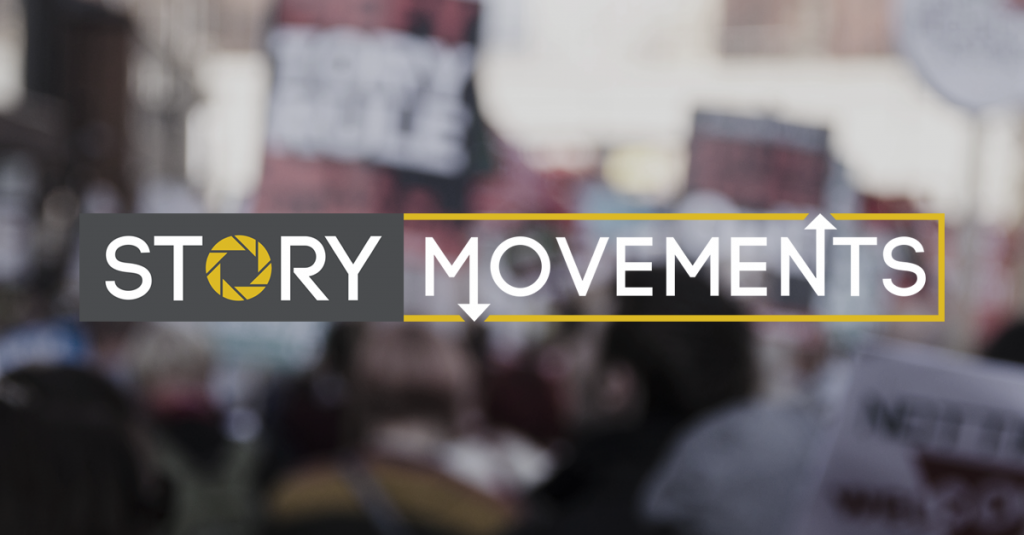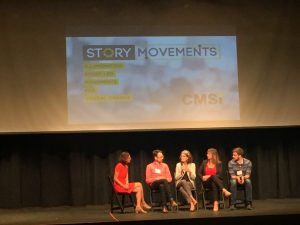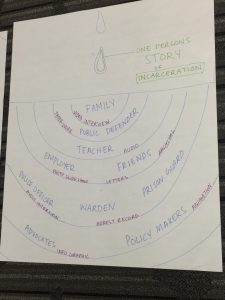
Ever since I found out about the Story Movements conference, I had been looking forward to attending a conference focused on story-led movements for social change. It’s not every day that you get to meet people who care about the same social justice issues as you and meet expert filmmakers, reporters and creatives. As a student and research assistant to Professor Caty Borum Chattoo, I was already aware of some of the conference speakers and the models discussed regarding narratives and storytelling. This conference added further inspiration and insight on how stories amplify the media, influence attitude and actions and mobilize grassroots networks.
The first day of the conference revolved around speaker talks that were divided into four themes: Represent, Expose, Empathize and Participate.
Day 1 Highlights

- Katie Galloway, filmmaker
- Katie produced a film called “The Return” which shifted the view of the incarcerated as dangerous and frightening and aimed to humanize the individuals
- Her advice on how to not lose viewers: connect before you correct, broaden those points of connections in the story by adding different characters they can relate to, then develop dimension with the characters
- Partnering up with TV shows like Last Week Tonight with John Oliver for the film’s promotional campaign allowed key information and emotional stories to be shared in difference places to compete with the dominant narrative about people in prison
- Mary Crowley, VP for Communications and Public Affairs, Vera Institute of Justice
- Adding human stories alongside data increased the impact and media reach of their report, “Telling the Story of Jail in America”
- Mary believes sharing the underrepresented story of women in jail helped gain the interest of major media outlets like Marie Claire and the New York Times
- Jonathan Skurnik, filmmaker
- Promoting diversity and acceptance of gender nonconformity in the media can help break stereotypes and prevent biases from developing
- Trans and gender nonconforming individuals are being portrayed as predatory, so it’s incredibly important to change that narrative
- His film on a trans teen’s struggles to be accepted at home and school sparked conversation and created opportunities for schools, agencies and other stakeholders to find a solution
- Curt Gayette, investigative reporter with the ACLU
- Curt’s reporting revealed the contamination of the water supply in Flint, Michigan and the government’s cover up of their negligence
- Working with the community to test the water and expose the truth through personal stories and film uplifted the issue of water safety on a national level
- Jamie Kalven, founder of the Invisible Institute
- Jamie helps tell compelling stories to explain the machine of violence and corruption and the disconnect between policy and lived reality of people
- The Citizen Police Data Project is a storytelling project based on aggregate statistics to illustrate how many Chicago residents had made complaints of police abuse-but were ignored
- The case of Laquan McDonald in 2014 captured our moral imagination, revealing a need to liberate stories of ordinary people
- Transparency and open access to information about police complaints is important for the public to counter the established narrative
Day 2 Highlights
The second day of the conference was the Create-a-thon, an interactive event where the attendees worked in groups to address a contemporary social justice issue with an original media product. The Create-a-thon was an eye-opening experience that pushed us to create and collaborate with people from different backgrounds with very little time, resources and expertise. I’m proud of all the projects that everyone came up and wished some of them could actually come to life.
 My group’s topic was ending mass incarceration, a pretty heavy topic, but one we all took on enthusiastically. The issue of mass incarceration is tied to issues of race, poverty and capitalism, so there were countless ways we could have approached raising awareness. We decided to illustrate the ripple effect that that the system of mass incarceration has on an individual and the rest of their community through an educational storytelling project called School the System.
My group’s topic was ending mass incarceration, a pretty heavy topic, but one we all took on enthusiastically. The issue of mass incarceration is tied to issues of race, poverty and capitalism, so there were countless ways we could have approached raising awareness. We decided to illustrate the ripple effect that that the system of mass incarceration has on an individual and the rest of their community through an educational storytelling project called School the System.
We’d collect stories of an incarcerated individual, their family, friends, neighbors, educators, legal professionals, public officials etc. and document them on a website. From there, we’d share the platform along with a prepared curriculum to invite students and teachers to document their own stories and interview people affected by the system. To successfully launch this project, our campaign needed a splashy media event so we came up with the idea of a satirical press event promoting turning community colleges into jails to mirror the decrease in college enrollment and increase in incarcerated people.
Overall, the Story Movements conference was an inspiring convening that I hope will usher progress and growth for the social impact communication field. It definitely gave me motivation for my own studies and potential capstone projects as I embark on my second and final year of grad school.
